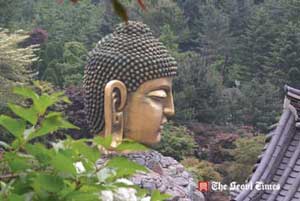The Seoul Times, May 4, 2009
Buddhists Join in Temple Services to Celebrate Buddha’s Birthday
Seoul, South Korea -- Millions of Korean Buddhists on May 2, 2009 took time out to celebrate the birth of Buddha some 2,500 years ago in a garden in India.
 Buddhism is one of the world's major religions and the Buddhist way of life of peace, loving kindness and wisdom is evident today throughout the world.
Buddhism is one of the world's major religions and the Buddhist way of life of peace, loving kindness and wisdom is evident today throughout the world.At Wawoojeongsa Temple, situated 48Km south of Seoul, hundreds of Buddhists observed the Buddha's Birthday with members of foreign diplomats corps accredited to Korea in memory of Buddha achieved enlightenment.
Foreign envoys included Amb. Myo LWIN of the Union of Myanmar and Amb.John Asitha Ivon PERERA of the Democratic Socialist Republic of Sri Lanka and their family members.
Buddha's Birthday should not only be about celebrating with parades and lanterns, but thanking him for believing and spreading his wisdom, a Buddhist follower said.
When Siddartha Gautama Buddha was born in Lumbini Garden, his father was a king and his mother was a queen. His name, Siddartha, was given to him by the king because it meant "every wish fulfilled."
Queen Maya, Buddha's mother, was en route to her parents' home to give birth, as was the custom of that time, and during a stop at Lumbini Garden, the child was born amidst flowering trees, plants and a gentle rain.
Legend tells us that when he was born, he took seven steps, pointed with his right hand to the heaven, pointed to the earth with his left hand, and declared ‘In the heaven above and below them, I shall be the one to save the universe."
Buddha was declaring the worthiness of having received unto himself, the life and blessing of the entire universe and having been born as a human being. He said this voice is not only of Buddha, but of each and every one of us who are born with our one and only human body and mind.
The Buddha's Birthday falls on the eighth day of the fourth lunar month. On this day, Buddhists pay respect to the Buddha at temples, recite Buddhist scriptures and perform a special ablution ceremony on the Buddha's image.
As part of the festivities, brightly decorated lanterns will be hung at Buddhist temples and along the streets in cities and towns across the nation. Downtown, a large pagoda-shaped lantern is currently brightening Seoul Plaza in front of City Hall and nearby, the Cheonggye Stream is awash with color.
For believers, the illumination of the lanterns symbolizes the enlightenment of the Buddha. The light means wisdom and mercy that shakes to their senses those who are lost in a world of greed.
The bathing ceremony is a reflection of the legend that says when the Buddha was born, he was washed by fragrant rain that sprang forth from the mouth of a dragon. This is the reason why his birthday is also known as the Buddha's Ablution Festival .
The water used for performing the bathing ceremony is scented with perfume and is called Fragrant Water. The ceremony is usually performed within a temple or on hallowed ground in the open.
The abbot of the temple makes the first incense offering and chants a sutra. Then the rest of the monks offer their incense and sing the Ablution Hymn.
The monks then pour small ladleful of Fragrant Water on the Buddha's image. Afterward, the Buddha's image is rinsed with clean water.
The whole process is accompanied by the singing of the Ablution Hymn. At the end of the ceremony, participants and devotees will use some of the water that has been used to bathe the Buddha's image to sprinkle on their own heads.
The ceremony is performed to commemorate the Buddha's Birthday, show him respect, and to pray for a good life. In Korea the birthday of Buddha is celebrated according to the Lunisolar calendar.
This day is called Seokga tansinil, meaning "the day of Buddha's birthday" or Bucheonim osin nal meaning "the day when Buddha arrived." Lotus lanterns cover the entire temple throughout the month which is often flooded down the street. On the day of Buddha's birth, many temples provide free meals and tea to all visitors. The breakfast and lunch provided are often sanchae bibimbap.
No comments:
Post a Comment